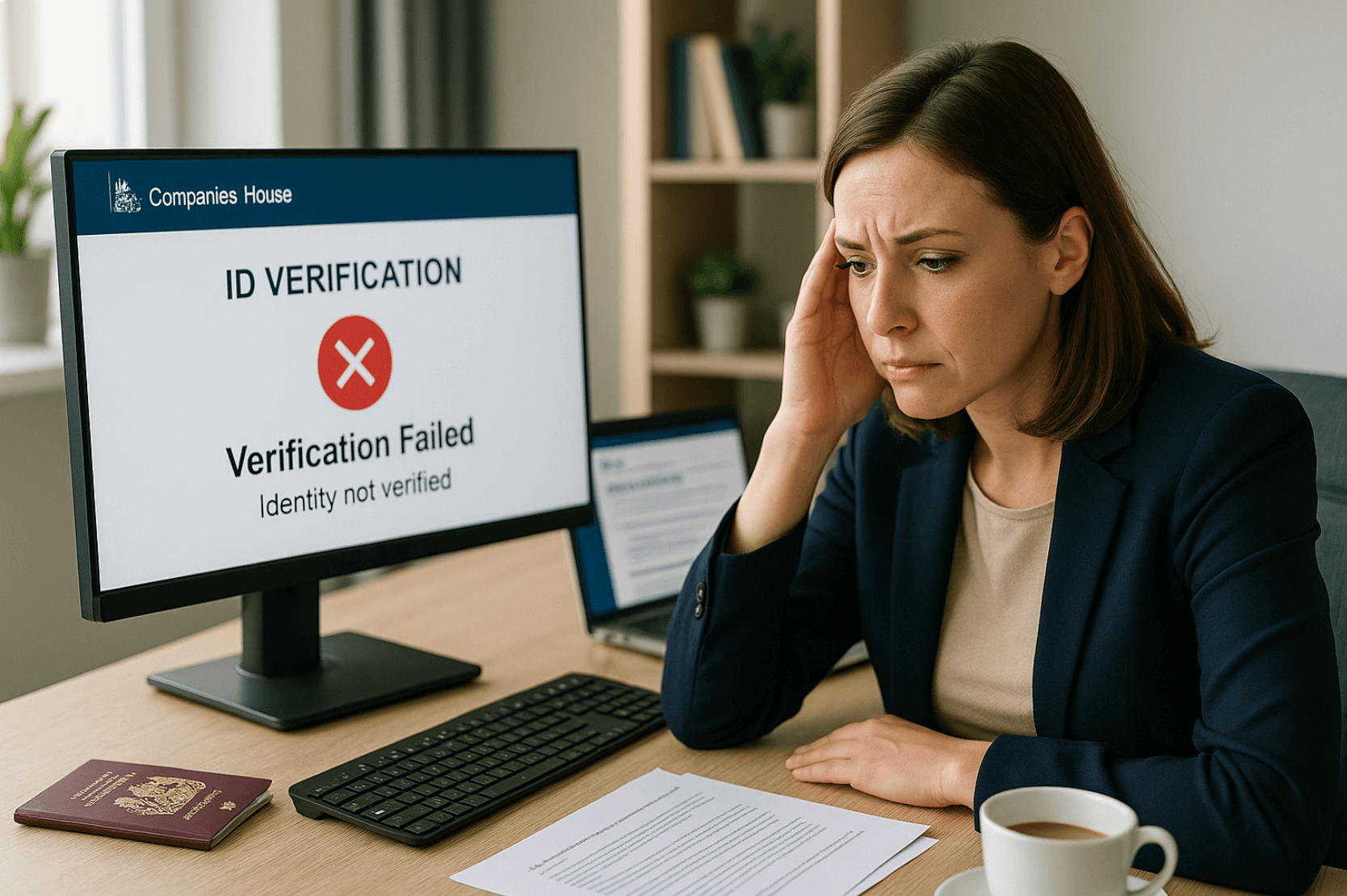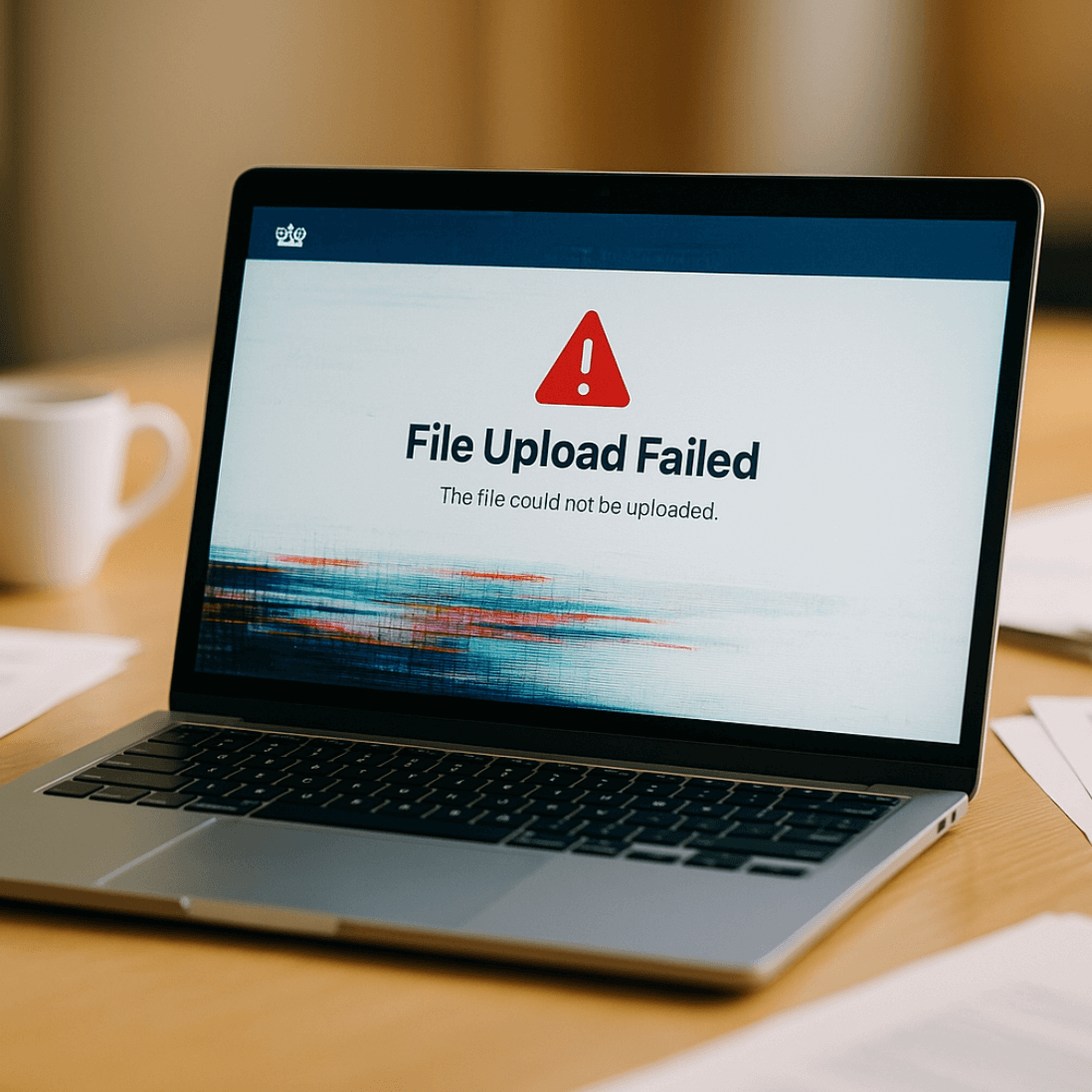Problems With Companies House ID Verification

Have you experienced companies house identity verification problems? You’re not alone.
Many UK companies and directors face challenges navigating the mandatory identity verification process introduced under new rules.
These changes aim to enhance corporate transparency and prevent economic crime, but they also come with specific requirements that must be met.
From ensuring your identity documents are valid to submitting accurate personal details, several factors contribute to a successful verification.
Failing to meet these legal requirements can delay filings, affect your business operations, and even lead to financial penalties.
Understanding the process and addressing issues promptly is key to compliance.
From invalid ID documents to mismatched details, we fix verification problems and guide you through the new Economic Crime and Corporate Transparency Act 2023 (ECCTA) compliance rules — so your company filings stay on track. Get verified now or contact us to see how we can help.
Understanding New Companies House Verification Requirements
The Role of Directors, Members and Persons with Significant Control and Compliance with Economic Crime and Corporate Transparency Act 2023
Companies House verification requirements have become stricter under the economic crime and corporate transparency act. These changes were introduced to curb economic crime and ensure that UK companies comply with corporate transparency regulations.

As a result, mandatory identity verification is now required for all individuals with significant control over a company, including existing directors, new directors, and general partners of LLPs who are registered a United Kingdom Companies House.
For a limited company or limited liability partnership, understanding these obligations is crucial. Failing to adhere to the identity verification requirements may result in rejected filings or other legal consequences. This process is designed not only to verify personal information but also to improve the overall integrity of the companies house register, enhancing trust in the UK business environment.
From 18 November 2025, ID verification is mandatory. One of the big things that will happen to companies who have non-verified officers is that filings will be blocked.
Acceptable ID Documents
To complete verification, provide one of the following. Details must match the information you submit.
-
Passport (biometric/MRZ) or Irish Passport Card
May be up to 6 months expired if cryptographic checks still pass.
-
Photocard Driving Licence
UK, Channel Islands, Isle of Man, or EU (full or provisional).
-
EU/EEA Biometric Identity Card
From the EU, Norway, Iceland or Liechtenstein.
-
UK Biometric Residence Permit (BRP)
May be up to 18 months expired.
-
UK Biometric Residence Card (BRC)
Accepted for identity verification.
-
UK Frontier Worker Permit
Accepted where applicable.
The document you provide must match your personal details in the application.
Key Identity Documents Needed
To complete the identity verification process, you will need to provide valid identification documents. Acceptable forms of ID include
- a biometric or machine readable passport, or an Irish passport card – these can be up to 6 months expired if identity checking technology can still validate the cryptographic features
- a UK, Channel Islands, Isle of Man and EU photocard driving licence (full or provisional)
- an identity card with biometric information from the EU, Norway, Iceland or Liechtenstein
- a UK biometric residence permit (BRP) – these can be up to 18 months expired
- a UK biometric residence card (BRC)
- a UK Frontier Worker permit
These documents must match the personal details you provide during the verification process.
Common reasons for problems verifying identity for Companies House
Verification failures can occur for several reasons.
One common issue is submitting incorrect or incomplete personal details.
For example, discrepancies between your personal information and the details on your ID documents can cause delays or rejections.
It’s crucial to double-check every piece of data before submitting it to the Companies House service.
Another frequent cause of failure is related to ID documents.
Outdated or invalid identification documents, such as an expired biometric passport or photo driving licence, can lead to rejection.

Technical errors during the identity verification process, such as issues with uploading files or using an incompatible device, can also result in problems.
Lastly, many people face difficulties due to last minute submissions.
There are also reports of just unexplainable glitches in Companies House’s system. And, from what we’ve heard, once you hit a glitch, there’s no way forward.
Steps to Resolve Companies House Verification Issues
Follow these quick steps to complete identity verification successfully.
-
Match Your Details
Ensure your name and date of birth match your ID exactly to prevent delays.
-
Use a Smartphone
Biometric checks work best on modern smartphones with good lighting.
-
Upload Clear Photos
Show the full document — no glare, blur, or cropped edges.
-
Check Before You File
Review all company data for accuracy before submitting to Companies House.
Steps to Resolve Companies House Verification Issues
How to Complete Identity Verification Successfully.
To ensure a successful verification process, make sure all your personal information matches your identification documents exactly. For instance, the name and date of birth on your biometric passport or photo driving licence should align with the details provided during the Companies House filings. Accuracy is key to avoiding unnecessary delays.
Using a smartphone for biometric checks can streamline the process and improve the user experience. Many online services provide step-by-step guidance on how to capture and upload the required documents. This not only simplifies the process but also minimizes the chances of technical errors. When filing documents on behalf of companies, ensure that every detail is accurate and in compliance with the legal requirements.
What to Do if Verification Fails
First things first, if your verification fails, there may not be anything you can do.
We are an ACSP and are verifying Director Identity for Companies House. Some of our Director ID Verification clients have said that, when they tried .GOV.UK and they were locked out… they simply could not do it. So if you don’t want to waste time. A lot of them called Companies House and were told that they may wish just to use an ACSP.
If your verification fails, the first step is to identify the reason for the rejection. This could involve reviewing your identification documents, personal details, or the company’s confirmation statement. Once you pinpoint the issue, you can take corrective action and try again.
In some cases, it might be necessary to seek assistance from an authorised agent or company formation agent. These professionals are experienced in navigating the Companies House service and can help you resubmit your documents through an online service. If you’re unsure about the next step, consulting an expert can save you time and ensure compliance with the new rules.
Implications of Failing Companies House Verification
Failing to complete the Companies House verification process can have significant consequences for UK companies.
For new companies, it can result in delays in registration, preventing them from operating legally. For an existing company, verification failures can hinder the ability to file documents or update information, impacting business continuity.
Non-compliance with the economic crime and corporate transparency laws can lead to financial penalties or even constitute a criminal offence. Moreover, repeated verification failures can negatively affect the browsing experience for stakeholders accessing the companies house register. It is essential for company directors and other individuals acting on behalf of a company to prioritise compliance to avoid these risks.
You see, from November 2025, a companies House personal code is required for filing company information after 18 November 2025. So, when it comes round to filing your company’s confirmation statement and other official documents, you’ll need to ensure that Directors ID is verified. Ensuring that these details are accurate and up-to-date is essential for a smooth running of your legal entity’s filings post November 2025.
So, get going, get compliant. You don’t want your company secretary breathing down your neck post November 2025 if you haven’t verified and they are trying to make a filing.
Ensuring a Smooth Companies House Verification Process
Preparation is the key to a hassle-free verification process. Start by gathering all necessary identity verification documents, such as a biometric passport, photo driving licence, or UK biometric residence permit. Make sure these documents are valid and match the personal information you intend to submit.
Using a verification service can simplify the process, especially for those unfamiliar with the identity checks required by the Companies House service. These services guide you through the ID check and ensure compliance with the mandatory identity verification requirements. Staying informed about updates to the process, such as the 12-month transition period ending on 18th November, can also help you stay ahead of deadlines.
Double-checking your personal information, email address, and other details before submission is another critical step. Taking the time to review your documents and data can save you from last-minute issues or resubmissions, ensuring a smooth experience.

I verified my identity with Companies House — so why can’t I file?
From feed back we’ve had from clients, people are struggling to file for a new company on the new companies house service due to authentication code issues. Here’s a detailed summary of what may be wrong.
Identity verification (DIV) only proves who you are. It does not give you authority to act for a company.
To file documents, you still need the company authentication code — a separate security step that proves you’re authorised to manage that specific company.
Think of it like this:
| Step | Purpose |
|---|---|
| DIV (Director Identity Verification) | Confirms your identity as an individual |
| Authentication Code | Allows you to act for a specific company |
If you don’t have the authentication code yet, you must request it to the registered office address or ask the existing agent to release it. Once the code is entered in your Companies House account, your filings will go through.
FAQs
Can I fix companies house identity verification problems?
Most verification failures occur because of mismatched personal information or invalid identity documents. Common issues include incorrect dates of birth, misspelled names, expired passports or driving licences, and low-quality uploads. Always make sure your ID details match the information registered at Companies House exactly.
What is the new Companies House identity verification requirement?
Under the Economic Crime and Corporate Transparency Act 2023 (ECCTA), all company directors, members of LLPs, and Persons with Significant Control (PSCs) must verify their identity with Companies House. This measure is designed to improve corporate transparency and prevent the use of UK companies for criminal activity.
Who needs to complete identity verification?
All existing and new company directors, LLP members, and PSCs are required to complete verification. Authorised agents such as Authorised Corporate Service Providers (ACSPs) can perform these checks on behalf of individuals or companies.
What happens if I don’t complete identity verification?
From 18 November 2025, Companies House will block filings for any company with unverified officers. Failure to comply may delay registrations, prevent updates, and could lead to financial penalties or criminal liability.
Which documents can I use for verification?
Acceptable identity documents include:
- A biometric or machine-readable passport (UK or Irish)
- A UK or EU photocard driving licence
- An EU, EEA, or Swiss biometric identity card
- A UK biometric residence permit or card
- A UK Frontier Worker permit
Documents must be valid and match your personal details.
Can I verify my identity if I’m overseas?
Yes. Directors and PSCs based outside the UK can verify their identity using an ACSP that offers remote verification services. These typically involve uploading your ID and completing biometric or video checks online.
What is an Authorised Corporate Service Provider (ACSP)?
An ACSP is a business (like Edward Young Notaries & Lawyers) authorised by Companies House to carry out identity verification checks on behalf of directors, PSCs, and company officers. Using an ACSP ensures your verification is compliant and securely recorded.
How can I fix a failed Companies House verification?
First, identify the cause — usually a mismatch in personal details or ID validity. Correct any errors and resubmit your verification. If you continue facing issues, contact an ACSP who can perform the verification for you and confirm compliance under ECCTA.
How long does identity verification take?
If done correctly, verification through a registered ACSP or the Companies House app typically takes a few minutes to a few hours. Delays often arise when documents need manual review or if the uploaded files are unclear.
Can my company formation agent or accountant do this for me?
Yes — but only if they are a registered ACSP. Not all company formation agents or accountants are authorised, so it’s important to confirm their registration before relying on them for ID checks.
Is identity verification required for existing directors?
Yes. All existing directors must verify their identity before the transition deadline of 18 November 2025. After this date, they won’t be able to authorise filings without a verified Companies House personal code.
What’s a Companies House personal code?
Once verified, each individual will receive a unique personal code linking their identity to all Companies House filings. This code will be required for confirmation statements, annual accounts, and other official submissions after November 2025.
Can I use an expired passport for verification?
In some cases, yes — a UK or Irish biometric passport can be accepted if it expired within the last 6 months and its chip can still be read by ID verification technology.
How can a notary or ACSP help me get verified?
Notaries and ACSPs can:
- Verify your identity in person or remotely
- Review your ID for accuracy
- Submit verification results to Companies House
- Provide you with your personal code once complete
Using a regulated ACSP ensures you stay compliant with ECCTA requirements.
Need Help? We Handle the Entire Process
If you need the services of a UK notary, give us a call on our phone number +442074992605, email us notary@notarypubliclondon.co.uk or complete the form below and we will guide you through the process.
Got your ID document to hand? Get verified in 5 minutes of your time